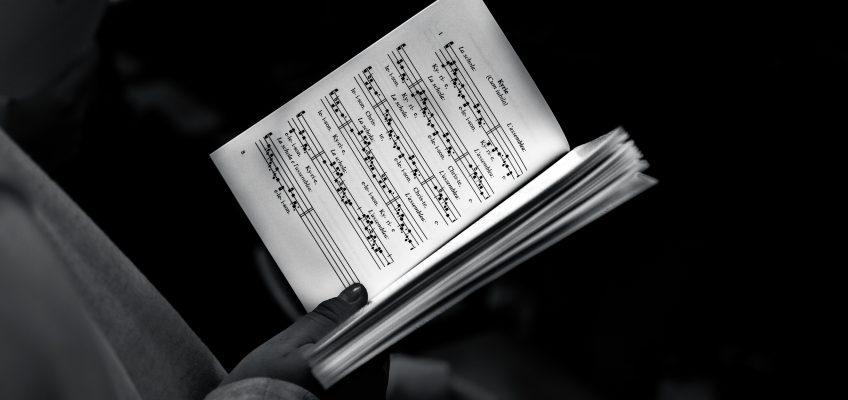As a liturgical musician, I often hear local music directors say to their ministers, “Let’s really pray this song,” or, “This is ministry, not American Idol,” and even sometimes, “Don’t be distracting, we’re not here for us, but for the assembly!” These statements are common and true — it is crucial to engage the gathered assembly in song during the Eucharistic Liturgy instead of being selfishly consumed with our own instruments.
And it is particularly important to remember that music is truly a prayer — a way in which we lift our collective voice to God. But what makes liturgical music a form of prayer? And how do we, as pastoral musicians, commissioned to accompany the assembly in sung prayer, put ourselves in a posture of prayer during the sung parts of the Liturgy?
While text that is liturgically appropriate and music that is well-achieved are crucial ... the text and music become more than that within the context of our prayer. Click To TweetThe core components: lyrics and musicality
I am asked this question often, sometimes in regards to approaching personal prayer in music, and other times within the context of music preparation for mass. But when answering this question, it is important to take a look at the two parts of Sacred Music that really make it sacred: lyrics and musicality.
Both of these aspects of sacred music play a tremendous role in the intentionality of personal prayer through music, but it seems as though the words themselves are used out of context as they relate to the effect music has on our prayer. Often times, the lyrics for sacred music are immediately thought of as “Liturgically Appropriate text,” and consideration for musicality often stops at “Music that is well-achieved and beautiful.”
While text that is liturgically appropriate and music that is well-achieved are crucial as part of the Liturgical, Pastoral and Musical Judgements by which we evaluate the appropriateness of music for worship, the text and music become more than that within the context of our prayer.
Yearning for relationship with the living Christ
Years ago, when I served as a member of the teen choir at the parish where I grew up, the music directors took us through a guided meditation when learning a new song. While we would expect to sight-sing through the piece first, the director would actually have us read the part of the scripture for the liturgy to which the song is related.
After a brief lectio divina and discussion on the reading’s context to the Liturgy of the Word, we would then look at the lyrics of the song, and think about the areas of the song that the Spirit was presenting to us in a special way. Then, we would listen to the song, feeling and being attentive to the ways in which the song was stirring within our hearts. The director would then ask the rhetorical question, “what is our God trying to reveal to you about himself in this song?”
We are challenged to let our God reveal himself to us in every song we sing together, regardless of our opinion of the song being sung, our personal taste for the specific style of accompaniment, or our egos as musicians. Click To TweetIt was then that we were truly able to use the song to grow in relationship with the living Christ, and truly capable of sharing in that yearning for closeness with our God with our parish community; the community for whom we were commissioned to share our gifts, and the assembly with whom we are called to worship in communion as the Body of Christ.
God is revealed to us when we sing
As Paul writes in his letter to the Colossians, we are called to let the word of Christ dwell in us, as we learn from one another, singing together with thankfulness in our hearts to God. We are challenged to let our God reveal himself to us in every song we sing together, regardless of our opinion of the song being sung, our personal taste for the specific style of accompaniment, or our egos as musicians.
We are commissioned by the Church to serve, but we are called by God to worship first and foremost; to lift up our hearts and spirits to God in prayer with one another through the gift of music.



Leave a Reply